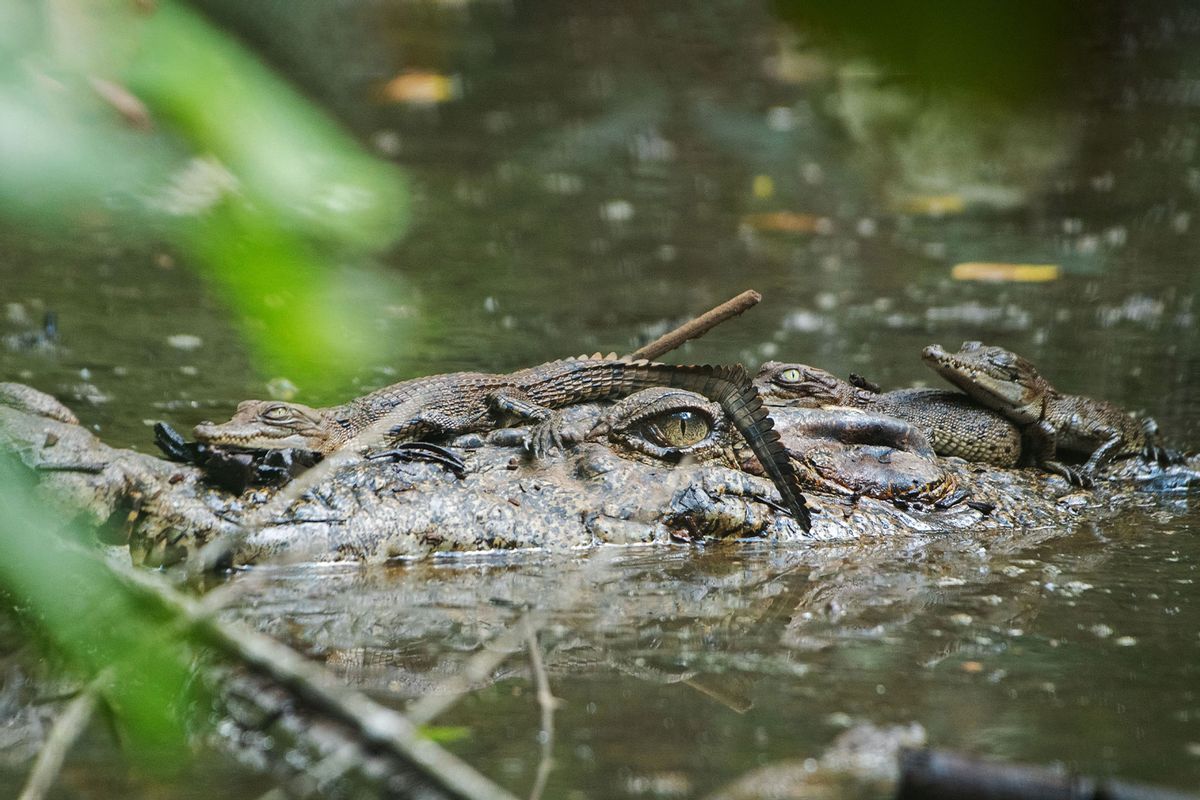After living alone in a Costa Rican zoo for 16 years, a biblical-like "miracle" happened: an 18-year-old female crocodile laid 14 eggs, despite never having a male partner. Seven eggs appeared to be fertile and were quickly artificially incubated. One included an unviable female fetus.
The news was first announced in a paper published in the journal Biology Letters this week and is certainly novel. It's the first time scientists have recorded in an American crocodile successful parthenogenesis, which is asexual reproduction and Greek for "virgin birth."
When parthenogenesis happens, the egg cell in the female's body divides enough times it needs in order to create half the genes required to procreate. In this process, cellular sacs called polar bodies are created as byproducts that contain chromosomes and can fertilize the egg. In vertebrates like crocodiles, one polar body can synthesize with the egg to make offspring. Through genomic sequencing, scientists found that the stillborn crocodile only contained genetic material from its mother, hence confirming parthenogenesis.
However, unlike how the New Testament portrays virgin births, in the animal kingdom, things are a little different. They are not a literal immaculate conception. In fact, a deeper look as to why parthenogenesis can happen is something less celebratory, in addition to how sustainable it is long-term. According to one theory, scientists believe that some animals can breed offspring with mating as a survival strategy — and the crocodile isn't the only one to practice it.
In 2015, scientists found that 3 percent of a critically endangered sawfish population in Florida were conceived through parthenogenesis. At the time, researchers thought that it could be a survival strategy to prevent inbreeding and prevent harmful mutations from happening. Still, researchers said it would likely lead to the demise of the population as species need genetic diversity to be resilient.
As the scientists of the crocodile paper explained, what was once considered rare, parthenogenesis has now been documented across multiple vertebrate lineages. "Over the past two decades, there has been an astounding growth in the documentation of vertebrate facultative parthenogenesis (FP)," the researchers stated, reporting this "unusual" reproductive mode has been documented in birds, reptiles like lizards and snakes and cartilaginous fishes like sharks and rays.
Want more health and science stories in your inbox? Subscribe to Salon's weekly newsletter The Vulgar Scientist.
Last year, a study published in the Journal of Fish Biology in November revealed a female endangered zebra shark at Chicago's Shedd Aquarium gave birth to offspring without having mated. In 2021, researchers discovered two female California Condors were able to reproduce without males while two years earlier, a female anaconda got pregnant by herself in a Boston aquarium. In the paper, researchers speculated the rise in female asexual reproduction is more common than previously believed, in part because scientists are looking for it, documenting it and are able to scientifically confirm it through whole-genome sequencing.
What was once considered rare, parthenogenesis has now been documented across multiple vertebrate lineages
Now, since a crocodile has been shown to be able to pull this off, it could be that dinosaurs may have been capable of parthenogenesis as a survival mechanism, too. "This new evidence offers tantalizing insights into the possible reproductive capabilities of extinct archosaurian relatives of crocodilians, notably the Pterosauria and Dinosauria," the researchers stated.
While female asexual reproduction could be a clever way of nature surviving a tough time, some researchers believe that it actually could be self-sabotaging. In a separate study published in 2021, researchers stated that it's "ecologically advantageous in the short term, but the young age and rarity of parthenogenetic species indicate it is less advantageous in the long term."
Matthew Moreira, who co-authored the paper entitled Parthenogenesis is self-destructive for scaled reptiles published in Biology Letters in 2021, told Salon via email that parthenogenesis can be a successful "short-term strategy" for a species to survive extinction.
"Through this reproductive mode, female individuals can reproduce without the need for a male partner which may allow all-female populations to avoid local extinction," Moreira said. "Hypothetically, this might even be more important in species such as the American crocodile where sex is temperature dependent."
Males, Moreira pointed out, are produced only when they're incubated at temperatures between 30º C and 33º C. Temperatures outside of this range produce all-female offspring,
"Certain temperature conditions may foster all-female populations, which can be overcome through facultative parthenogenesis," he said.
In other words, it's not sustainable to survive extinction. Indeed, if the dinosaurs had the capability, it clearly didn't work. Sadly, as the American crocodile showed, it didn't reproduce a viable fetus, which the researchers weren't surprised to find.
"While it is disappointing that the crocodile parthenogen produced here failed to hatch, it is not uncommon to see non-viable fetuses and developmental abnormalities within litters or clutches of parthenogens and long-term failure to thrive even for individuals born outwardly healthy," the researchers stated.
Moreira said the news about the crocodile is "novel and interesting" and suggests that this reproductive mode could date back to even before the dinosaurs.
"In fact, the widespread nature of this reproductive mechanism across lizards, snakes, birds and now crocodilians, suggests that this could be an ancestral trait dating even further back in time to the ancestor of all reptiles (~280 million years ago) and inherited throughout their evolutionary history," Moreira said.
The discovery is a bit fortuitous as it coincides with the 30th anniversary of "Jurassic Park," which prominently features parthenogenesis in dinosaurs. As Dr. Ian Malcolm would say, "Life uh, finds a way."

Shares